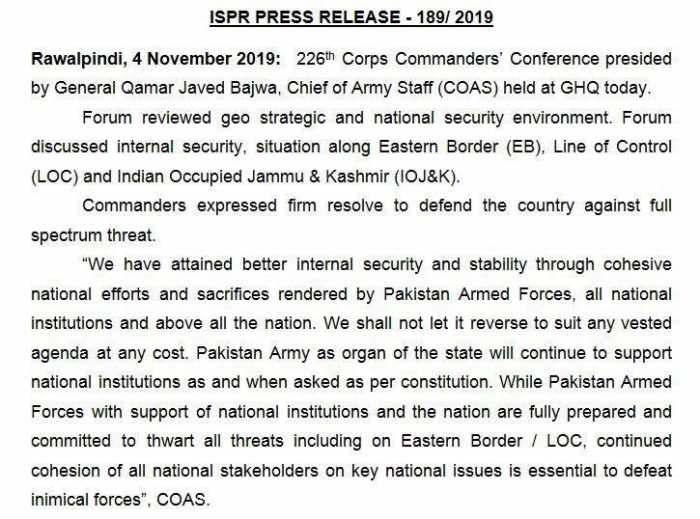Reading Time: 3 minutes approx.
PAK ARMY CHIEF Expressed Firm Resolve To Defend The Country Against Full Spectrum Threat in 226th CCC:
The CHIEF OF ARMY STAFF (COAS) General Qamar Ahmed Bajwa reaffirm the firm resolve, will and commitment to Defend the Sacred Country PAKISTAN against the Full Spectrum Threat in a 226th Corps Commanders Conference Held at General Headquarters (GHQ) Rawalpindi on Monday, 4 Nov, 2019.
The Top-Level Military Brass of the Country reviewed geo-strategic, geopolitical situation of the country. Moreover, different key issues related to national and regional security also came under discussion.

The Top Military Commanders of PAKISTAN also discussed the recent fragile situation along the Line of Control, Eastern Border and the Grave Inhumane Situation and lockdown in indian Occupied Jammu & Kashmir (IOJ&K).
CCC at GHQ. Geo strat & national security environment reviewed. Internal security, situation along Eastern Border, LOC and IOJ&K discussed.
Commanders expressed firm resolve to defend the country against full spectrum threat.(1of3). pic.twitter.com/mYNVaZtfOO— DG ISPR (@OfficialDGISPR) November 4, 2019
“We have attained better internal security and stability through cohesive national efforts and sacrifices rendered by PAKISTAN ARMED FORCES, all national institutions & above all the nation. We shall not let it reverse to suit any vested agenda at any cost”. The CHIEF OF ARMY STAFF (COAS) General Qamar Ahmed Bajwa has said in 226th Corps Commanders Conference (CCC).
Top Military Brass of the Country vows their unflinching resolve and commitment to defend the Sacred Country PAKISTAN from all types of Internal and External Threats and to Support the National Institutions at all cost.
“Pak Army as organ of state will cont to sp national institutions as & when asked as per constitution. While Pak Armed Forces are fully prep to thwart all threats, cont cohesion of national stakeholders on key national issues is essential to defeat inimical forces”, COAS.(3of3). pic.twitter.com/e4UZ7OYWLF
— DG ISPR (@OfficialDGISPR) November 4, 2019

















